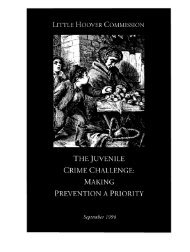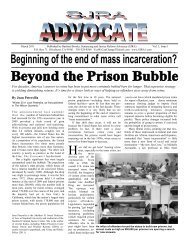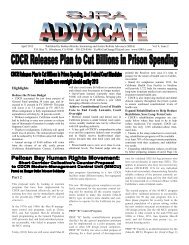Jailhouse Lawyer's Handbook - Sentencing and Justice Reform ...
Jailhouse Lawyer's Handbook - Sentencing and Justice Reform ...
Jailhouse Lawyer's Handbook - Sentencing and Justice Reform ...
You also want an ePaper? Increase the reach of your titles
YUMPU automatically turns print PDFs into web optimized ePapers that Google loves.
For more detailed information on what must be<br />
available, you may want to read some of the following<br />
cases: Johnson v. Moore, 948 F.2d 517 (9 th Cir. 1991);<br />
Corgain v. Miller, 708 F.2d 1241 (7 th Cir. 1983); Cruz<br />
v. Hauck, 627 F.2d 710 (5 th Cir. 1980) or take a look at<br />
the American Association of Law Libraries list of<br />
recommended books for prison libraries. This list is<br />
reprinted in the Columbia Human Rights Law Review<br />
<strong>Jailhouse</strong> Lawyers’ Manual. Ordering information for<br />
the Columbia Manual is in Appendix E. However, you<br />
need to keep in mind the fact that these cases <strong>and</strong> lists<br />
have limited value today, <strong>and</strong> must be understood in<br />
connection to Lewis v. Casey.<br />
Federal courts have also required that prisons libraries<br />
provide tables <strong>and</strong> chairs, be of adequate size, <strong>and</strong> be<br />
open for inmates to use for a reasonable amount of<br />
time. This does not mean that inmates get immediate<br />
access, or unlimited research time. Some cases that<br />
explore these issues are: Shango v. Jurich, 965 F.2d<br />
289 (7 th Cir. 1992); Lindquist v. Idaho State Bd. of<br />
Corrections, 776 F.2d 851 (9 th Cir. 1985); Cepulonis v.<br />
Fair, 732 F.2d 1 (1 st Cir. 1984).<br />
Inmates who cannot visit the law library because they<br />
are in disciplinary segregation or other extra-restrictive<br />
conditions must have meaningful access some other<br />
way. Some prisons use a system where prisoners<br />
request a specific book <strong>and</strong> that book is delivered to the<br />
prisoner’s cell. This system makes research very hard<br />
<strong>and</strong> time-consuming,<br />
<strong>and</strong> some courts have<br />
held that, without<br />
additional measures,<br />
such systems violate a<br />
prisoner’s right to<br />
access the courts. See,<br />
for example, Marange<br />
v. Fontenot, 879 F.<br />
Supp. 679 (E.D. Tex.<br />
1995).<br />
5. Getting Help from<br />
a <strong>Jailhouse</strong> Lawyer<br />
You have a limited<br />
constitutional right to<br />
talk with other<br />
prisoners about legal<br />
concerns. You have a<br />
right to get legal help<br />
from other prisoners<br />
unless the prison<br />
“provides some<br />
reasonable alternative<br />
What if I don’t have a<br />
law library?<br />
Many prisons have either<br />
closed their law library or<br />
not re-stocked it with new<br />
material in years. If this is<br />
the case in your law library<br />
<strong>and</strong> you or someone you<br />
know on the outside has<br />
access to a lawyer, you can<br />
try <strong>and</strong> bring suit against the<br />
prison for not complying<br />
with Bounds. If not, you<br />
could try publicizing the fact<br />
that your prison is failing to<br />
comply with a Supreme<br />
Court ruling by sending<br />
press releases to various<br />
media outlets, like<br />
newspapers, television, <strong>and</strong><br />
the internet.<br />
to assist inmates in the preparation of petitions.”<br />
Johnson v. Avery, 393 U.S. 483, 490 (1969). This<br />
means that if you have no other way to work on your<br />
lawsuit, you can insist on getting help from another<br />
prisoner. In Johnson, the Supreme Court held that the<br />
prison could not stop prisoners from helping each other<br />
write legal documents because no other legal resources<br />
were available.<br />
If you have other ways to access the court, like a law<br />
library or a paralegal program, the state can restrict<br />
communications between prisoners under the Turner<br />
test if “the regulation… is reasonably related to<br />
legitimate penological interests.” Turner v. Safley, 482<br />
U.S. 78, 89 (1987). The Supreme Court has held that<br />
jailhouse lawyers do not receive any additional First<br />
Amendment protection, <strong>and</strong> the Turner test applies<br />
even for legal communications. Therefore, if prison<br />
officials have a “legitimate penological interest,” they<br />
can regulate communications between jailhouse<br />
lawyers <strong>and</strong> other prisoners. Shaw v. Murphy, 532 U.S.<br />
223, 228 (2001).<br />
Courts vary in what they consider a “reasonable”<br />
regulation. Johnson itself states that “limitations on the<br />
time <strong>and</strong> location” of jailhouse lawyers’ activities are<br />
permissible. The Sixth Circuit Court of Appeals said<br />
that it was OK to ban meetings in a prisoner’s cell <strong>and</strong><br />
require a jailhouse lawyer to only meet with prisonerclients<br />
in the library. Bellamy v. Bradley, 729 F.2d 417<br />
(6th Cir. 1984). The Eighth Circuit Court of Appeals<br />
upheld a ban on communication when, due to a<br />
transfer, a jailhouse lawyer is separated from his<br />
prisoner-client. Goff v. Nix, 113 F.3d 887 (8 th Cir.<br />
1997). However, the Goff court did require state<br />
officials to allow jailhouse lawyers to return a<br />
prisoner’s legal documents after the transfer. Id. at<br />
892.<br />
6. Your Right to Be a <strong>Jailhouse</strong> Lawyer<br />
The right to counsel is a right that belongs to the person<br />
in need of legal services. It does not mean that you<br />
have a right to be a jailhouse lawyer or provide legal<br />
services. Gibbs v. Hopkins, 10 F.3d 373 (6th Cir.<br />
1993); Tighe v. Wall, 100 F.3d 41, 43 (5th Cir. 1996).<br />
Since jailhouse lawyers are usually not licensed<br />
lawyers they generally do not have the right to<br />
represent prisoners in court or file legal documents with<br />
the court, <strong>and</strong> the conversations between jailhouse<br />
lawyers <strong>and</strong> the prisoner-clients are not usually<br />
privileged. Bonacci v. Kindt, 868 F.2d 1442 (5 th Cir.<br />
1989); Storseth v. Spellman 654 F.2d 1349, 1355-56<br />
(9 th Cir. 1981). Furthermore, the right to counsel does<br />
not give a prisoner the right to choose whom he wants<br />
JAILHOUSE LAWYERS HANDBOOK – CHAPTER FIVE<br />
65





